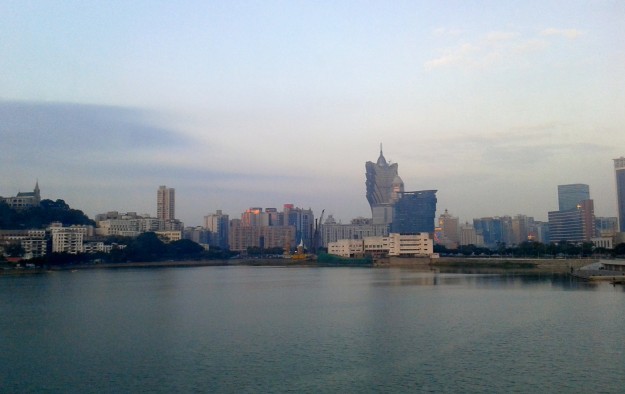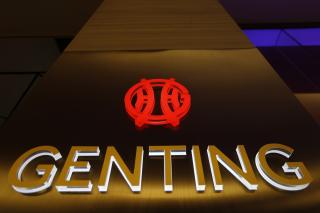Credit Suisse calls ‘policy bottom’ on Macau
Jul 07, 2015 Newsdesk Latest News, Macau, Top of the deck

Investment analysts at Credit Suisse AG in Hong Kong have called what they refer to as a “policy bottom” for the Macau casino market, which has been buffeted by 13 straight months of year-on-year revenue declines. Macau’s accumulated casino gross gaming revenue (GGR) for the first six months of 2015 stood 37.0 percent lower than in the same period in 2014,
Analysts Kenneth Fong and Isis Wong said in a note on Tuesday that the bank saw a “policy ‘bottom’ with an upside recovery option”.
“We believe that the worst is over for the sector,” they stated. “We see a fundamental shift towards supportive policy (from both Macau and the central government), and seasonally stronger months are ahead,” added the Credit Suisse team.
The bank specifically identified the relaxation announced last week of a rule on length of stay in Macau for transit visa holders – from five days to seven days provided they have proof of onward travel – as a sign of “a fundamental shift towards more supportive policy”.
Credit Suisse added: “Negatives are already priced in… 2Q EBITDA [earnings before interest, taxation, depreciation and amortisation] could fall 42 percent year-on-year, but it is backward-looking.”
The bank added: “With the VIP segment’s share falling to only 20 percent of EBITDA, upon a full [smoking] ban, a 10 percent hit to the VIP segment would only hurt total earnings by 2 percent… The construction of new projects has already slowed. We believe the government has factored in the supply situation in policy formulation/relaxation.”
The Macau government formally announced on June 30 that it would seek a total ban on smoking in Macau casinos. Implementation of such a policy is likely early next year, despite warnings from analysts that it could hit gaming revenue.
Nonetheless a note on Monday from analysts at brokerage Sanford C. Bernstein Ltd in Hong Kong, saw the Macau government’s transit visa policy announcement as a potential positive.
“Since the transit visa rule tightened in July 2014, we estimated that the transit visa use fell by more than 50 percent year-on-year. We believe this relaxed rule is positive for premium mass and VIP [players],” wrote senior analyst Vitaly Umansky and his colleagues Simon Zhang and Bo Wen.
But a report on July 1, from Morgan Stanley Securities Asia Ltd, was sceptical about the impact of allowing a lengthened stay for transit visa holders.
“The negative impact on high end visitors was felt in 2014 because they were coming illegally and used to cancel onward journeys. That restriction [proof of onward journey] still remains. Since the average length of stay in Macau is 1.4 days, any extension of stay beyond five days may not be material,” said the Morgan Stanley team led by Praveen Choudhary.
Policy issues
A range of investment analysts have identified government policies at local Macau level as well as national level within China as contributing to the Macau decline in casino GGR. Some of those – such as increased oversight of cross-border financial transactions between mainland China and Macau – are said to be linked specifically to China’s anti-corruption drive.
Other policies relate to mainland macroeconomic policies that saw a tightening of credit conditions in China late last year and early this. Analysts say liquidity in markets such as mainland China real estate is one element to be considered regarding the payment cycle of Macau’s traditionally credit-based VIP gambling segment.
The mainland’s central bank, the People’s Bank of China, has recently been signalling some easing on liquidity conditions. In late June, it cut benchmark interest rates and also relaxed the reserve ratio requirements (RRR) for China’s banks – the amount of liquid assets banks are required to hold as reserves rather than lend out. A cut in late June to the RRR was the third such reduction in nearly five months.
But analysts Cameron McKnight and Tiffany Lee of Wells Fargo Securities LLC pointed out in a note on July 2 that there is commonly a six-month lag between a loosening of credit in the mainland China consumer loans market and a growth in casino junket play volume in Macau and other markets visited by Chinese high rollers that use credit to gamble.
July estimates
The two Wells Fargo analysts said in a note on Monday that based on checks of unofficial industry returns from July 1 through to July 5, average daily revenue (ADR) market wide for the Macau casino industry was MOP630 million (US$78.9 million), which they said was 9 percent higher than June’s ADR of MOP579 million.
“Based on checks through July 5, 2015, we estimate a July Macau gaming revenue decline of 30 percent to 32 percent versus our prior estimate of 30 percent,” stated Wells Fargo. “This assumes July same store ADR will trend in line with historical seasonality and takes into account the ramp of Galaxy Phase 2,” added the institution, referring to the opening on May 27 of Macau casino operator Galaxy Entertainment Group Ltd’s extension to its flagship Cotai resort, Galaxy Macau.
Japanese brokerage Nomura said in a note on Tuesday it acknowledged the possibility of what it called “a stabilising regulatory environment” in Macau, but thought the idea that fresh casino supply in Macau would create fresh consumer demand “remains unproven”.
“With weak growth visibility and unattractive valuations (19x 2015F P/E [price to earnings ratio]), we maintain our cautious stance on the sector,” wrote analysts Richard Huang and Stella Xing. They added that if daily run rates for Macau table games moved a shade above the HKD568 million (US$73.2 million) it estimated for the first five days of the month, the brokerage expected Macau’s July GGR to decline 33 percent year-on-year, versus a 38 percent year-on-year aggregate decline in tables-only revenue in the six months to June 30.
Daiwa Securities Group Inc analysts Jamie Soo, Adrian Chan and Jennifer Wu said in a note on Monday that based on current daily run rates to July 5, it expected Macau’s GGR for July to decline 34 percent year-on-year.
Sanford Bernstein estimated – assuming an ADR of MOP600 million to MOP630 million for the rest of the month – that Macau’s July GGR decline would be between 31 percent and 34 percent year-on-year.
Credit Suisse said in a note on Monday that full-month GGR could drop between 27 percent and 30 percent. But its team added regarding early July numbers: “Due to the short period of time (only 5 days of data), we don’t suggest reading too much into the data.”
Related articles
-
 Bloomberry new loan to aid earnings,...
Bloomberry new loan to aid earnings,...Oct 18, 2024
-
 Oct Golden Week Macau visit tally beats...
Oct Golden Week Macau visit tally beats...Oct 08, 2024
More news
-
 Added disruption in 4Q amid Londoner...
Added disruption in 4Q amid Londoner...Oct 24, 2024
-
 45pct of Mega Fortris US$23mln IPO for...
45pct of Mega Fortris US$23mln IPO for...Oct 24, 2024
Latest News
Oct 24, 2024
Macau casino operator Sands China Ltd says it will have more rooms out of commission during the fourth quarter this year amid the ongoing development work at The Londoner Macao resort (pictured)....Sign up to our FREE Newsletter
 (Click here for more)
(Click here for more)
Pick of the Day
”Our new programme [for the fourth tower of Marina Bay Sands] creates a full-scale integrated resort development with a full suite of amenities, including gaming capacity”
Patrick Dumont
President and chief operating officer of Las Vegas Sands
Most Popular
 Genting Singapore to wind up seven Japan units October 21, 2024
Genting Singapore to wind up seven Japan units October 21, 2024  Macau, Cambodia most feel loss of China VIP play: S&P October 22, 2024
Macau, Cambodia most feel loss of China VIP play: S&P October 22, 2024  LVS flags US$8bln investment in Marina Bay Sands IR2 October 24, 2024
LVS flags US$8bln investment in Marina Bay Sands IR2 October 24, 2024  Mohegan Inspire mass table drop tripled since open: firm October 23, 2024
Mohegan Inspire mass table drop tripled since open: firm October 23, 2024  Sands China announces new US$4.2bln credit facility October 23, 2024
Sands China announces new US$4.2bln credit facility October 23, 2024








